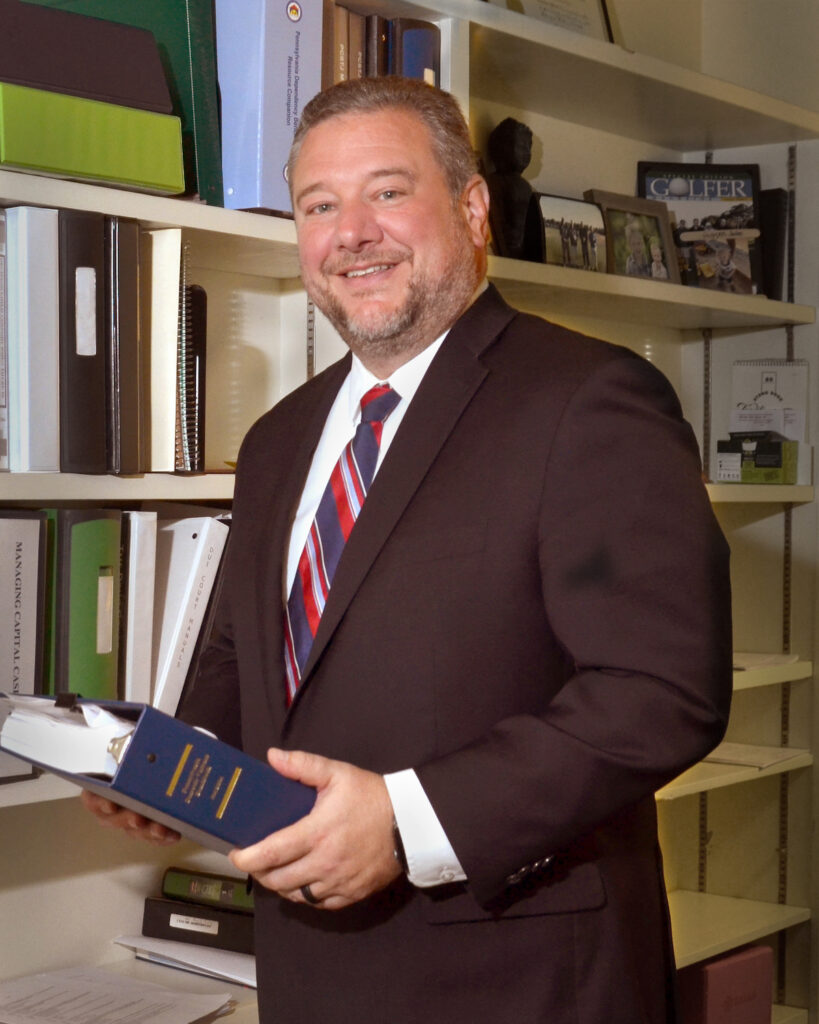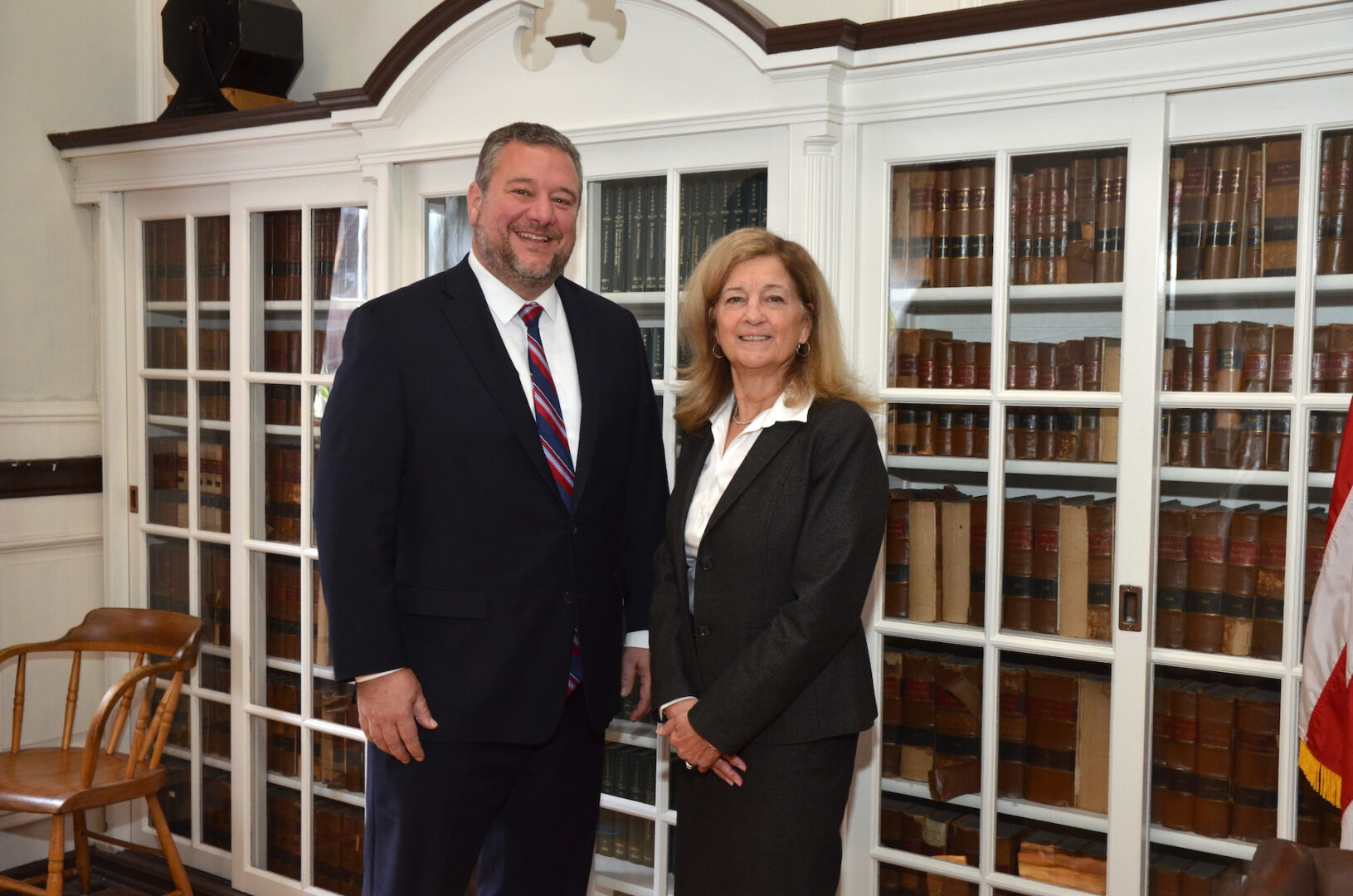In 2007, after practicing law for 21 years, Pamela Ruest ran for judge of the Centre County Court of Common Pleas. She won her election over a young district magisterial judge just seven years removed from law school, Jonathan Grine.
Four years later, Grine ran again—successfully—and the two became colleagues on the bench.
Now, Grine is preparing to become Ruest’s successor. On January 1, Ruest will retire as Centre County president judge, a position she has held since 2017. Grine is next in line to replace her.
According to Pennsylvania judicial procedure rules, in counties with seven or fewer judges, the president judge is selected based on length of continuous service. Centre County’s court has four judges, and of the three judges remaining upon Ruest’s retirement, Grine has seniority, earning him the title.
“It just means I’ve survived the longest,” he chuckles.
But the position is no joke. Centre County’s president judge oversees six district courts as well as the probation office, the domestic relations office, court reporters, and court administrators. They also are responsible for things like court security, budgets, and policy-making—all while handling a full caseload in the courtroom.
“I think a president judge has to be a jack-of-all-trades. You have to be able to multitask, and most of all, you have to be good at human relations,” Ruest says. “Judge Grine and I have been working together, and I think he is going to do a great job. He’s going to be ready.”
Making history
Ruest’s journey to the judiciary began in Connecticut, where she grew up. She says she initially had no intention of pursuing a law degree, majoring in biology at the University of Connecticut and obtaining her master’s degree in statistics there as well. Eventually, however, the study of law piqued her interest, and she went on to earn her J.D., her third degree from UConn.
Ruest worked as an attorney for over two decades, most of those years specializing in family law at the firm of McQuaide Blasko in State College. She says she first started thinking about the possibility of running for judge in the 1990s.
“We had never had a judge who was a woman, we never had judges who knew much about family law, and I just thought we needed someone who knew about family law,” she says.
In 2007, she ran and was elected to a ten-year term on the court, becoming the first woman judge in Centre County history. She successfully ran for retention in 2017. That same year, President Judge Tom Kistler retired, and Ruest was next in line for the position.
“I never expected that was going to happen, but here I am,” she says.

During her tenure as president judge, Ruest oversaw renovations to the Centre County courthouse and faced the toughest challenge the court had ever seen when the coronavirus pandemic broke out in 2020.
“We kept going during the pandemic and kept the courts open; that was a good thing,” she says. “It was a big challenge because we had to keep things open and moving, but had to keep people healthy.”
She says they were able to do this with the help of the Centre County commissioners and Penn State University, who helped the courts by letting them use space at the Penn Stater Hotel and Conference Center for socially distanced jury selection for over a year.
One of the accomplishments Ruest is proudest of is helping to create a drug court in 2018 to assist individuals with addiction. She has remained deeply involved with the program, meeting regularly with her team as well as with participants in the program.
“We really are just trying to give people tools to get sober and then to maintain sobriety,” she says. “I think we really are helping people, helping them transform their lives.”
Drug court is one of the things Ruest says she will miss the most after retirement. Still, she thinks she is ready for this next phase of life, saying, “I want to enjoy traveling and life while my husband [Jeff Jones] and I are still healthy enough to do it. We’ve seen so many of our friends have health issues. I have a huge bucket list of places I want to go, and it’s time for me to start working on it.”
Still, she says, “Some days I’m good about retiring, and the next day I’m like, ‘Why am I doing this?’ It’s really been quite an honor and privilege to have been a judge. It’s been very rewarding. I’ve enjoyed it. So I’m easing into it; I’ll still be involved in the system.”
Ruest will remain involved because she has been approved by the state to serve as a senior judge, which means she can fill in at any court in Pennsylvania as needed. Initially, she plans to work in Centre County for about ten days per month until another judge is elected to take her place. Meanwhile, Judge Brian Marshall will take over the leadership of the drug court, while Judge Katherine Oliver will lead the new mental health court, which is on target to launch in early 2023.
Serving the public
Along with the drug court and mental health court, the county is also starting a veterans court and continues to operate a DUI court. Grine sees these services as filling growing and crucial needs, even as the court works to maintain an ever-increasing case load. He believes case flow management will be one of his biggest challenges as he takes over as president judge.
“Back until 1997, Centre County was a two-judge county. Then it became a three-judge county, and in 2005 it became a four-judge county. Now here we are, 17 years later, and we are still a four-judge county, but the [population] growth has continued,” he says. “So making sure we’re getting resolutions for the citizens and the parties that are using the court system is one of my main goals out of the gate.”
In addition, he says, he hopes to focus on staffing, modernizing technology, and continuing to build and expand treatment courts.
A native of Bellefonte, Grine is the son of former Centre County President Judge David E. Grine. Although he is proud to be following in his father’s footsteps, like Ruest he did not initially plan on pursuing a career on the bench.

He majored in administration of justice at Penn State and originally hoped to become a state police officer. However, upon graduating, he encountered a hiring freeze within the Pennsylvania State Police and decided to head to Penn State Dickinson Law School, earning his law degree in 2000. He worked in private practice for Lee, Green & Reiter before successfully running for a State College borough district magisterial position in 2003. He is now in the first year of his second term as a Centre County judge.
“It wasn’t so much the judicial aspect that I openly thought about; it was the public service aspect that drew me in. I actually get that from both my mom and my dad. My mom was a schoolteacher for a long time, and that was something else I was possibly interested in—becoming a secondary English teacher,” he says. “It just so happened that the way things were falling in my life, I was kind of on that legal path, so a little bit of hard work and a little bit of circumstance kind of led to it.”
As Grine prepares to guide the court through any and every upcoming challenge, that public service aspect is something he views as central to his role on the bench.
“Human relations is pretty much the core of what we do. It’s kind of customer service. I started out when I was younger working as a waiter and bartender, and it’s pretty much the same thing, except in here the customer is not always right,” he says. “But at the same time, you want to provide as much excellent service as you can and to understand that that’s what you’re here for. You’re here in a service position, and our service just happens to be the law.” T&G
Karen Walker is a freelance writer in State College.



